- IHE Delft Institute for Water Education, Delft, Netherlands
Small islands, while hosting only about 1% of the global population, are among the most vulnerable regions to climate change. Their critical importance in climate adaptation is often overlooked, and their value as natural laboratories is frequently lost in discussions on sustainable development and climate adaptation. Beyond their well-documented vulnerabilities, small islands serve as invaluable scientific laboratories, illustrating the interconnected impacts of water, environment, society, and economy. Due to their small size and “islandness,” these provide a condensed and accelerated view of natural and anthropogenic phenomena, which are harder to observe in larger, more distributed geographies. Investing in research and adaptation strategies for these communities addresses their immediate needs and offers critical insights and early warning signs for broader global climate challenges. This paper argues for increased attention and resources for small islands, emphasising their role as microcosms that reflect broader environmental trends and highlighting the urgent need for targeted adaptation measures.
Small islands
Small islands are generally defined as landmasses with a surface area of less than 10,000 km2 (Nunn, 1987), but this distribution is highly skewed, with the vast majority of islands having very small land areas (Figure 1). While explicit data on the characteristics of inhabited islands (as opposed to island nations) is unavailable globally, Figure 2 illustrates the average surface area per island. Among the 12 island nations with more than 100 constituent islands, the Maldives and Marshall Islands stand out, averaging less than 1 km2 per island.
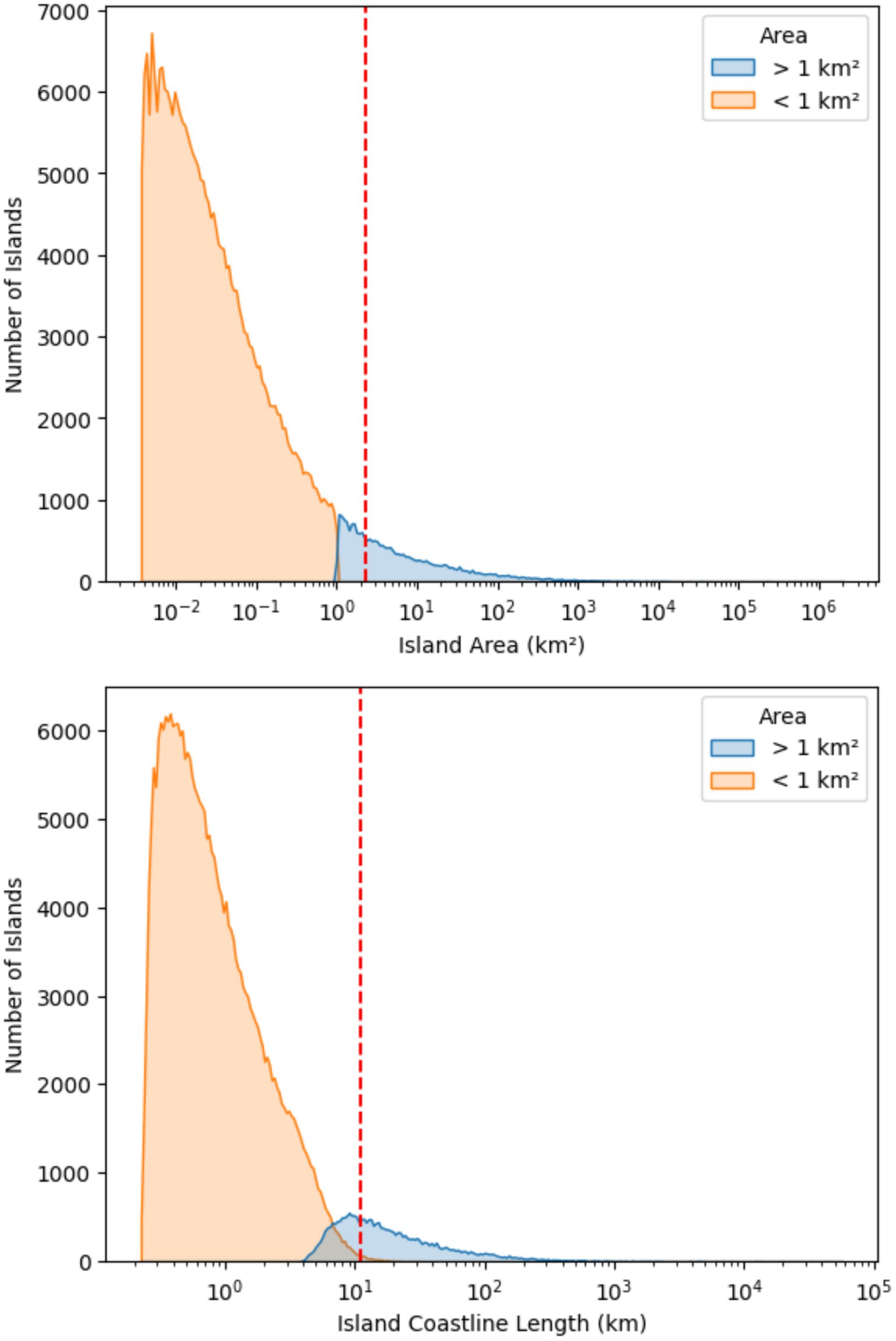
Figure 1. A global distribution of islands based on Area (km2) (top) and Island coastal line length km (bottom). The 95th percentile lines are shown. 95% of the islands are less than 2 km2 in area or less than 10 km in coastline length. Source: USGS (Sayre et al., 2018). Islands and rocky outcrops smaller than 0.0036 km2 are not considered.
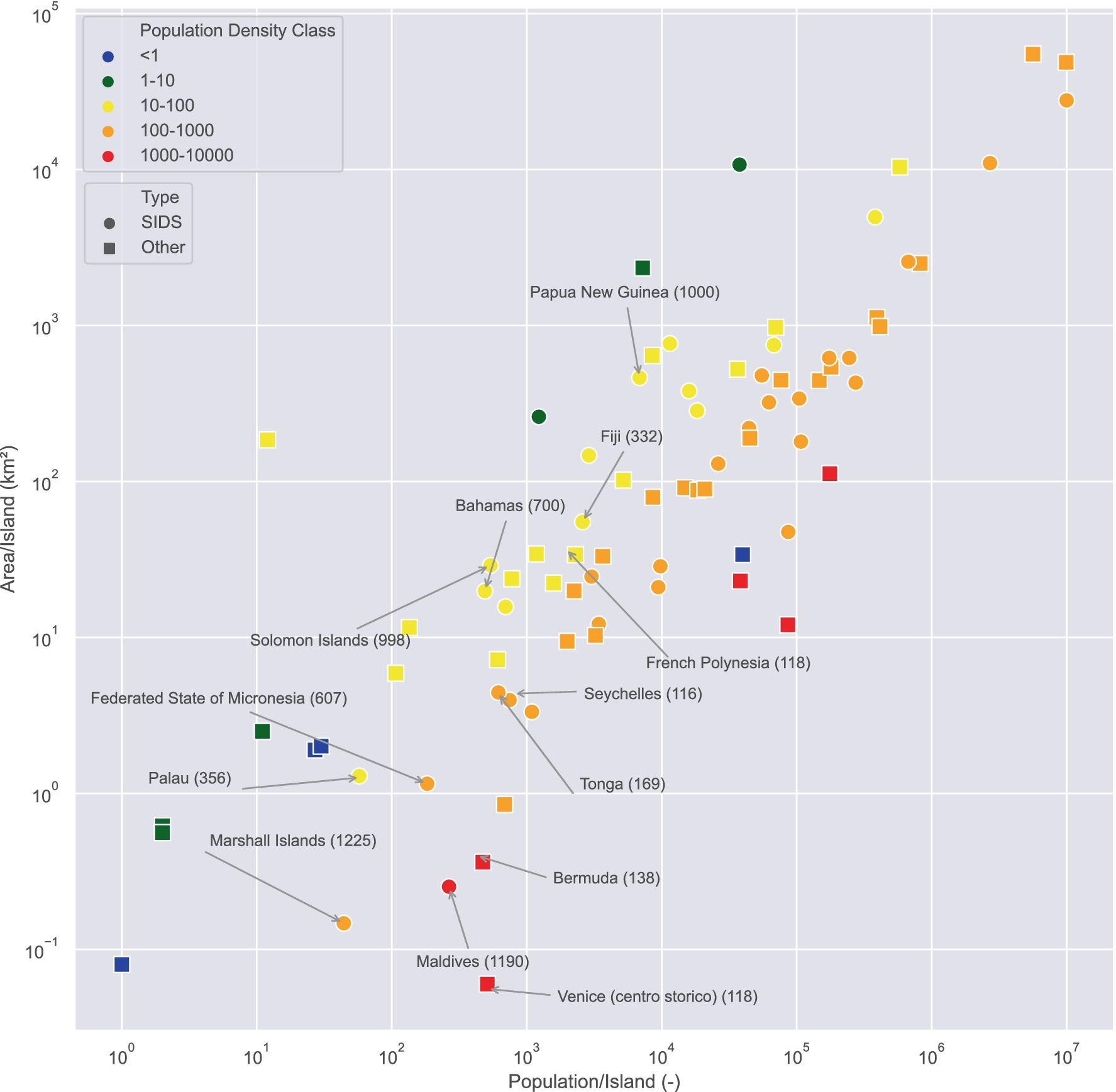
Figure 2. There are island nations that comprise many islands. The plot shows the average area per island against the population-to-island ratio. Colours represent population density (inhabitants/km2). Only islands that are independent states are labelled. The approximate number of constituent islands is given in parentheses. Marshall Islands (1,225), Maldives (1,190), Papua New Guinea (1,000), Solomon Islands (998), Bahamas (700), the Federated States of Micronesia (607), Palau (356), Fiji (332), Tonga (169), French Polynesia (118), and Seychelles (116) are islands states that have more than 100 constituent islands. Maldives and Marshall Islands have less than 1 km2/per island. Computed using the data from IIDB (IIDAB, 2023).
Small island developing states (SIDS)
The international community has recognised a distinct group of countries for their unique economic, environmental, and social challenges, specifically due to their ‘islandness’ (Thomas et al., 2020; Foley et al., 2023). Spread across the Caribbean, Pacific, Atlantic, Indian Ocean, and South China Sea (AIS) regions, these states face significant vulnerabilities due to their small size, remote locations, and exposure to climate impacts and natural disasters. Though small in land area, these islands command vast ocean territories (Dégremont, 2022), which are vital for their economies and cultural identities. Figure 3 shows the ‘Exclusive Economic Zone’ (EEZ) of countries of the world against their land area, revealing that there are 26 countries and territories where EEZ is at least 25 times their land area. Of these, 22 (except Portugal, Ecuador, Costa Rica, and Equatorial Guinea) belong to SIDS. Many small island developing states have very small land areas relative to their coast length (Figure 4). As a result, these nations are particularly vulnerable to oceanic changes, such as sea-level rise. Ten nations have 1 km2 of land area per 1 km of coastline: Micronesia, Tokelau, Palau, Maldives, Marshall Islands, Monaco, Nauru, Kiribati, Seychelles, and Tuvalu. Of these, eight—excluding Monaco and Tokelau—are classified as SIDS.
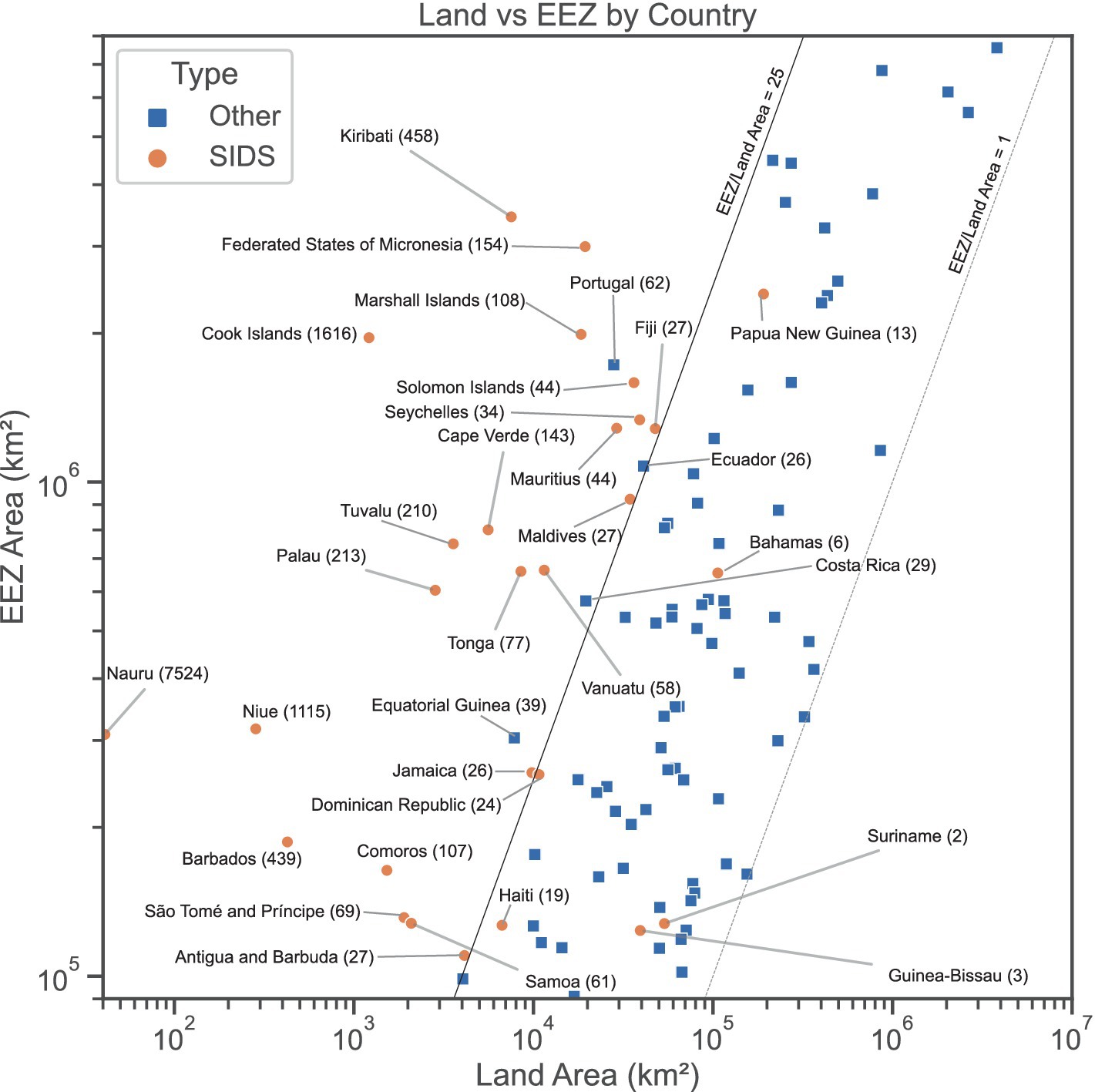
Figure 3. Exclusive economic zones of countries against land area. Lines with EEZ/Land Area 1 and 25 are also shown. Data source: Sea Around Us (Pauly et al., 2020). There are 26 countries with EEZ at least 25 times the land area (above the solid line), of which 22 are islands in the SIDS list.
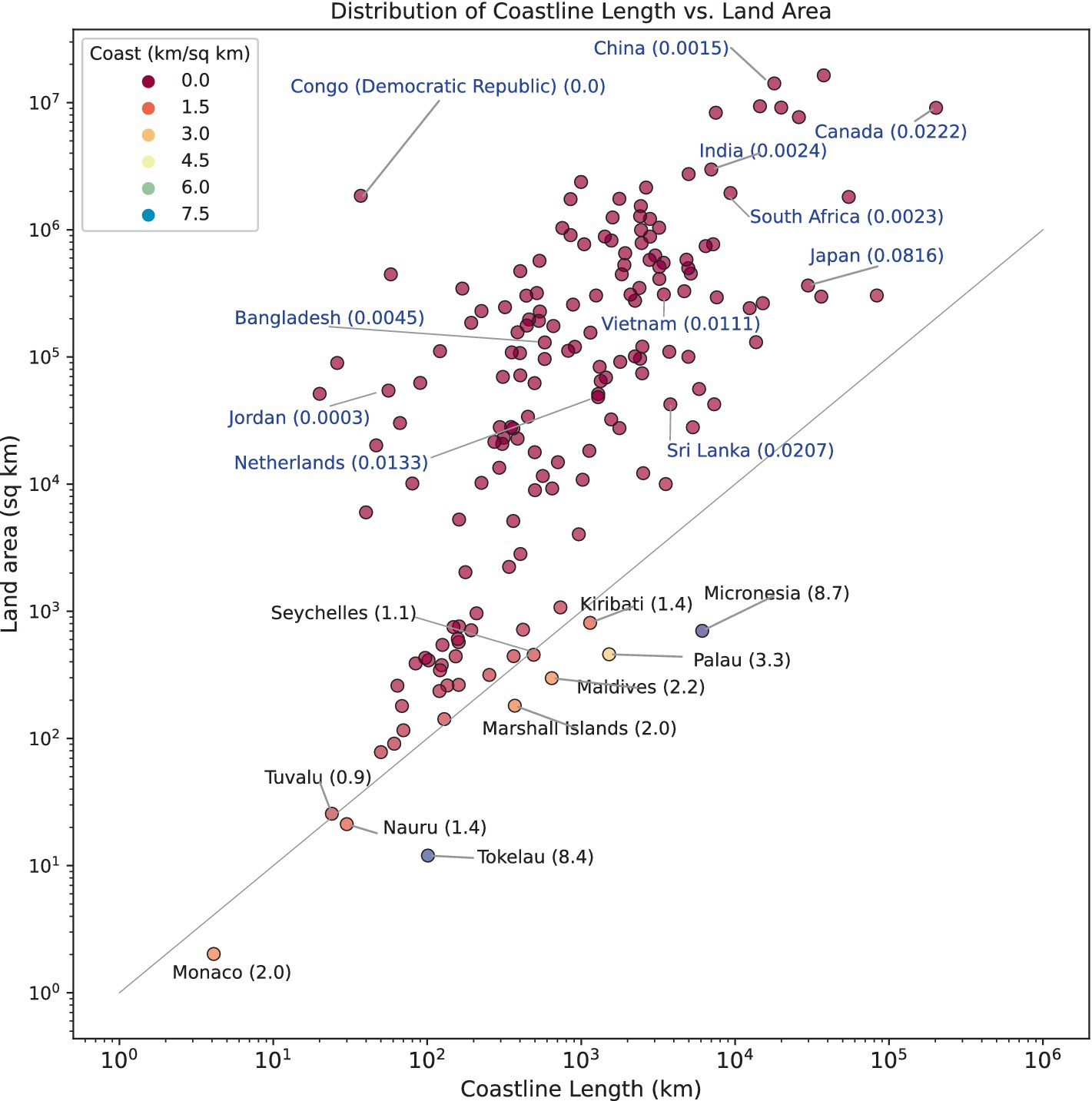
Figure 4. Some small island states have extremely small land area per km of coast length. This makes them exceptionally sensitive to changes in the ocean (e.g., sea level rise). Several selected other nations are labelled for comparison. Ten nations have less than 1 km2 of land per 1 km of coastline: Micronesia, Palau, Kiribati, Maldives, Seychelles, Marshall Islands, Tokelau, Nauru, Tuvalu and Monaco. Some non-independent territories that are not states have been removed. Several selected other nations are labelled for comparison. Data source: CityPopulation (2023).
SIDS have been the focus of international attention due to their unique challenges and needs. Important international initiatives like the Barbados Programme of Action (BPOA) and the Mauritius Strategy for Implementation outline specific actions and strategies at national, regional, and global levels to support the sustainable development of SIDS (Dubrie et al., 2020; Calado et al., 2024). These programmes emphasise climate change adaptation, disaster risk management, and the sustainable use of marine resources, among other priorities (UN, Department of Economic and Social Affairs Sustainable Development, 2023).
Specific challenges and opportunities
Due to their geographical isolation internationally and within nations, small islands face unique environmental, economic, and social challenges compounded by their vulnerability to climate change. The Intergovernmental Panel on Climate Change (IPCC) has highlighted the acute risks small islands endure (Mycoo et al., 2022). While the increased frequency of extreme weather events, sea-level rise, and socioeconomic disruptions are ubiquitous, small islands are much more vulnerable to those hazards due to their size, remoteness, and close association with the ocean. Small islands often face constraints in financial and human resources, limiting their ability to implement climate adaptation strategies effectively. Economically, small islands often depend on industries like tourism and fisheries, which are highly vulnerable to climate impacts. The disruption of these industries due to climate-related oceanic changes may lead to significant economic decline and livelihood failures (Nicholls et al., 2010). Cultural aspects, including losing heritage sites and traditional knowledge, further complicate their adaptation challenges. Environmentally, small islands are at risk of losing biodiversity and essential ecosystem services (Balzan et al., 2018), which are crucial for their resilience and economic stability. The degradation of coral reefs (Fudjaja et al., 2020), which are vital for protecting coastlines and supporting marine life, is particularly concerning. These environmental losses directly impact food security and human health, further exacerbating their vulnerabilities. Despite these challenges, small islands have demonstrated remarkable resilience (Mycoo et al., 2022). Local adaptation strategies have been developed, integrating traditional knowledge and community-based approaches to enhance sustainability and resilience (Shivakoti et al., 2022), which are vital for ensuring the long-term habitability and economic viability of small island communities.
The report ‘SDG – The Future is Now’ (Messerli et al., 2019) identifies six entry points for transformation to achieve the 2030 agenda and Sustainable Development Goals (SDGs), namely: (1) Human well-being and capabilities, (2) sustainable and just economies, (3) food systems and nutrition patterns, (4) energy decarbonisation with universal access, (5) urban and peri-urban development, and (6) global environmental commons. A brief look at these six SDG entry points highlights the challenges and opportunities for SIDS and small islands in general.
Human wellbeing and capabilities
Global poverty and inequality are the major thrusts of this entry point. For small islands, these challenges are exacerbated by their unique circumstances. One well-understood phenomenon is the so-called “island paradox”: the concurrence of high vulnerability to the risk of external shocks and relative prosperity (e.g., being highly sought-after tourist destinations) compared to other types of economies (di Friedberg et al., 2020). This was vividly illustrated by the impact of the COVID-19 pandemic on many SIDS: reductions in international tourism and foreign remittances severely impacted the economies of these islands (Sachs et al., 2021). Figure 5 shows two important aspects of the impact of tourism on countries: tourism expenditure in the country as a ratio of GDP and the annual tourist arrivals as a fraction of the population. Compared to all income categories, the average for SIDS is significantly higher. This overdependence also led to a steep economic crash during the COVID-19 pandemic. Figure 6 shows tourism expenditure and arrivals using the same ratios. Sixteen countries are above the 95th percentile in at least one of these ratios, of which 13 are SIDS. While tourism can be seen as an economic benefit for these countries, numerous environmental and social challenges are associated with it (Scheyvens and Momsen, 2020). Additionally, disproportionate reliance on tourism (as illustrated by Figure 5) leaves these islands particularly vulnerable during global economic downturns (Pratt, 2015; Connell, 2023; Puig-Cabrera et al., 2023).
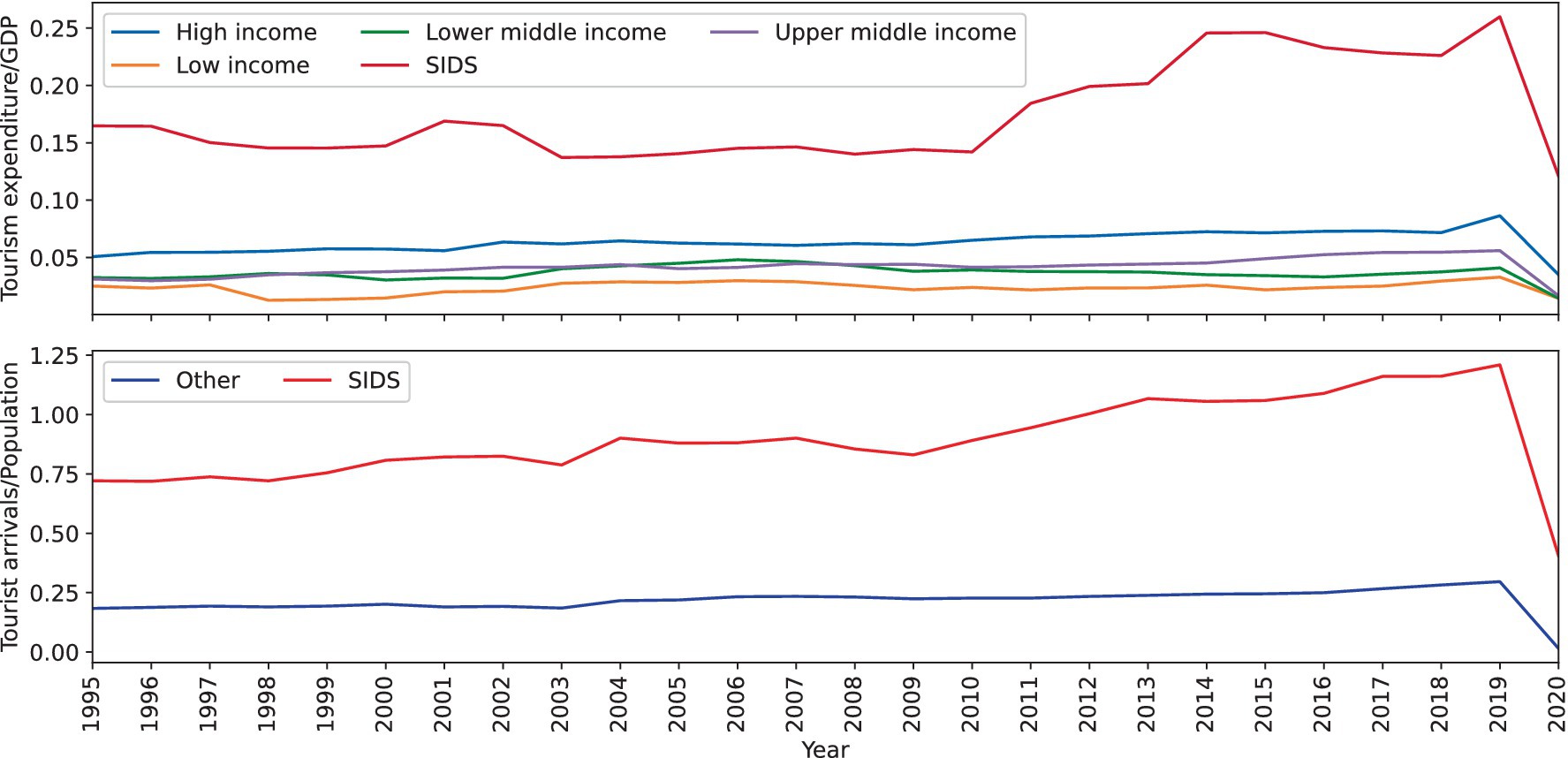
Figure 5. Influence of tourism on countries. Top: The average of the total expenditure by tourists in the country as a fraction of GDP for different income classes. SIDS are shown as a different group. Bottom annual tourist arrivals as a ratio of the population of the country.
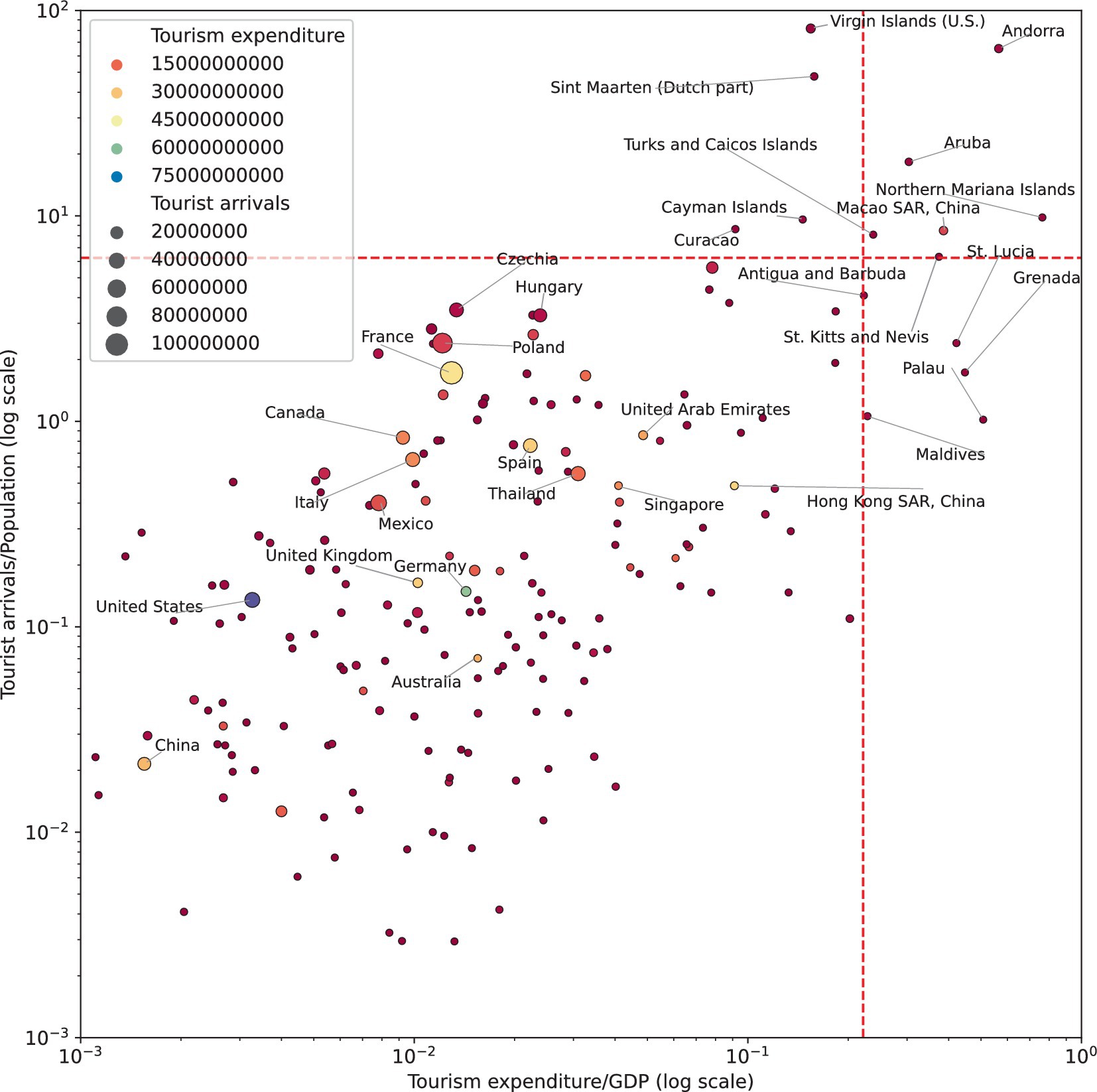
Figure 6. Tourism expenditure and arrivals. The horizontal axis represents the ratio of tourism expenditure to GDP, while the vertical axis shows annual tourist arrivals as a fraction of the population. Countries with the highest total absolute values of tourism expenditure (above the 95th percentile) include Australia, China, France, Germany, Hong Kong SAR (China), Italy, Singapore, Spain, the United Arab Emirates, the United Kingdom, and the United States. Those with the highest total tourist arrivals are Canada, China, Czechia, France, Hungary, Italy, Mexico, Poland, Spain, Thailand, and the United States. However, the ratios of these values to GDP and population tell a very different story: Countries with both a high ratio of tourism expenditure to GDP and a high ratio of tourist arrivals to the population include Andorra, Aruba, Macao SAR (China), Northern Mariana Islands, St. Kitts and Nevis, and Turks and Caicos Islands. Additionally, countries like Antigua and Barbuda, Cayman Islands, Curacao, Grenada, Maldives, Palau, San Marino, Sint Maarten (Dutch part), St. Lucia, and the Virgin Islands (U.S.) satisfy at least one of these conditions. Out of these 16 countries, 13 are on the SIDS list, with the exceptions being Andorra, Macao SAR (China), and San Marino.
Sustainable and just economies
Measures like GDP often hide the complexities and inequalities of small island economies. For instance, many SIDS that are highly dependent on tourism may show high GDP figures, but economic activities do not contribute adequately to the well-being of the wider society, and sometimes, they can even adversely affect it by driving up the cost of living. The Maldives’ tourism sector provides a clear example: According to Scheyvens (2011), tourism development in the country has exacerbated economic inequalities (with a small elite controlling the industry, while many Maldivians are excluded from its revenues) and social exclusion (despite being a highly desirable tourist destination, much of the population experiences poor living conditions, especially in the outer islands, and has minimal social and cultural exchange).
Food system and nutrition patterns
Due to geographical isolation and small economies, island nations do not often have the critical mass needed for the healthy development of local food production systems (Hickey and Unwin, 2020). For example, in the Solomon Islands, population growth, declining agricultural and fisheries productivity, and the negative influence of the global food industry have primarily contributed to a malnutrition crisis in their rural communities (Albert et al., 2020).
Energy decarbonisation with universal access
Small islands often face unique challenges when providing infrastructure, including electricity, due to their small, isolated population centres. As a result, many non-renewable energy systems become unaffordable and even more polluting. At the same time, small islands have unique opportunities to achieve energy sustainability using renewable sources like solar power (since many islands are in tropical and sub-tropical regions), wind, and wave power (due to large sea areas) (Arévalo et al., 2022). There are interesting and complex links between energy and other infrastructure needs. For example, all water production systems in the Maldives rely on energy-intensive desalination, which is mainly driven by small, inefficient island-level diesel generators (Acciarri et al., 2021). Conversely, waste-to-energy approaches can provide synergistic solutions to the challenges of isolation in small islands (Mata-Lima et al., 2021).
Urban and peri-urban development
Many small islands, particularly tiny coral islands like those in the Pacific and Maldives, face isolation challenges typical of small villages and the concentration pressures of densely populated urban sprawls similar to large cities. They create high population densities that place heavy demands on urban-like services such as piped water supply, electricity, and telecommunications, with neither the hinterlands nor the scale needed to support them (Baldacchino, 2006; Dean et al., 2016; Fernandes and Pinho, 2017; Adshead et al., 2021). Figure 7 illustrates the population density of 186 inhabited islands in the Maldives against their land area. It highlights the challenge of providing services to small islands. Many of these islands are densely populated, making the effective use of nature-based services (e.g., groundwater recharge) difficult due to lack of space. At the same time, due to a lack of scale due to their small populations prevent them from achieving efficiencies in typical infrastructure solutions, such as electricity generators and desalination plants.

Figure 7. Population density (#/km2) vs. Area of constituent islands of the republic of the Maldives are shown as dots. Population densities of selected countries are also shown in their Land area within parentheses (Blue horizontal lines). Out of inhabited 186 Maldivian islands, 142 have a population density higher than 1,000 inhabitants/km2. For clarity, only a few islands are annotated. The Greater Male’ Area—the capital—is shown as a red horizontal line. Population size categories are shown in the legend. There are 40 and 113 islands with less than 500 and 1,000 inhabitants, respectively, and only 24 islands with populations greater than 2,000. Data source: Census Maldives (2023).
Global environmental commons
Although their contribution to global greenhouse gas emissions is minimal, SIDS are disproportionately affected by climate change, threatening their survival (Mycoo et al., 2022), which only exacerbates their existing vulnerabilities. The United Nations has proposed a ‘Multidimensional Vulnerability Index (MVI)’ (Sachs et al., 2021), covering three dimensions: economic vulnerabilities, structural development vulnerabilities, and exposure to climate risks and natural disasters. Sachs et al. (2021) found a negative correlation between MVI and the achievement of SDGs. SIDS score higher on all three dimensions of vulnerability compared to the rest of the world. Factors such as food imports, small population sizes, dependence on tourism, and export concentration were identified as significant explanatory variables. Hillbom et al. (2023) compared SIDS to the global average in terms of three dimensions of sustainability: economic, social, and environmental. They found that adult obesity and low levels of gender equality were more pronounced in SIDS compared to the global average, while poverty was less prevalent—likely due to high tourism income (e.g., Kumar and Stauvermann (2023)). However, the actual contribution of tourism to citizens’ well-being is often questioned (Scheyvens and Momsen, 2020), as issues like economic disconnectedness (Peterson, 2023) and conflicting priorities (Druten, 2023) persist.
Small Island Developing States (SIDS) face unique and profound challenges with climate adaptation and sustainable development due to their geographic isolation, limited resources, and heightened vulnerability to environmental risks (Bush, 2018). Rising sea levels, extreme weather events, and ocean acidification are disproportionately affecting these islands, threatening not only their ecosystems (Wilson, 2017) but also the livelihoods of their populations, which often rely on fisheries, agriculture, and tourism (Tandrayen-Ragoobur et al., 2024). Despite these challenges, SIDS are often at the forefront of climate negotiations, advocating for more ambitious global climate policies and pushing for more substantial commitments from larger, more industrialised nations (Rasheed, 2019). Their acute vulnerability to climate change makes them powerful voices in international forums such as the United Nations Framework Convention on Climate Change (UNFCCC), where they play a crucial role in shaping discussions around mitigation and adaptation strategies (Rolland, 2024).
But, are they unique?
Hau’Ofa (1995) stated that continental men, namely Europeans, on entering the Pacific after crossing huge, expanses of ocean, introduced the view of ‘islands in a far sea’. Even today, we see outer islands that are ‘too small to appear on the map’ (Figure 8), whether it is at a global scale or national (e.g., the dichotomy of the ‘Greater Male’ area, Addu city and ‘outer islands’ of Republic of the Maldives). Is this ‘predicament’ of small islands unique to small islands? One obvious similarity exists with remote rural communities like villages and hamlets. They are also similarly distant from large population centres and have relatively concentrated small populations. Sometimes, the collective term “micro-communities” has been used to denote this similarity in literature, though the term is not exclusive to geographical denomination and can be confusing. Neves et al. (2014) compared rural and island communities regarding (Energy) infrastructure. While remote villages tend to achieve higher renewable energy penetration due to lower demand and simpler system requirements, small islands often require more complex hybrid systems with reliable backup and energy storage to manage seasonal fluctuations and peak demand.
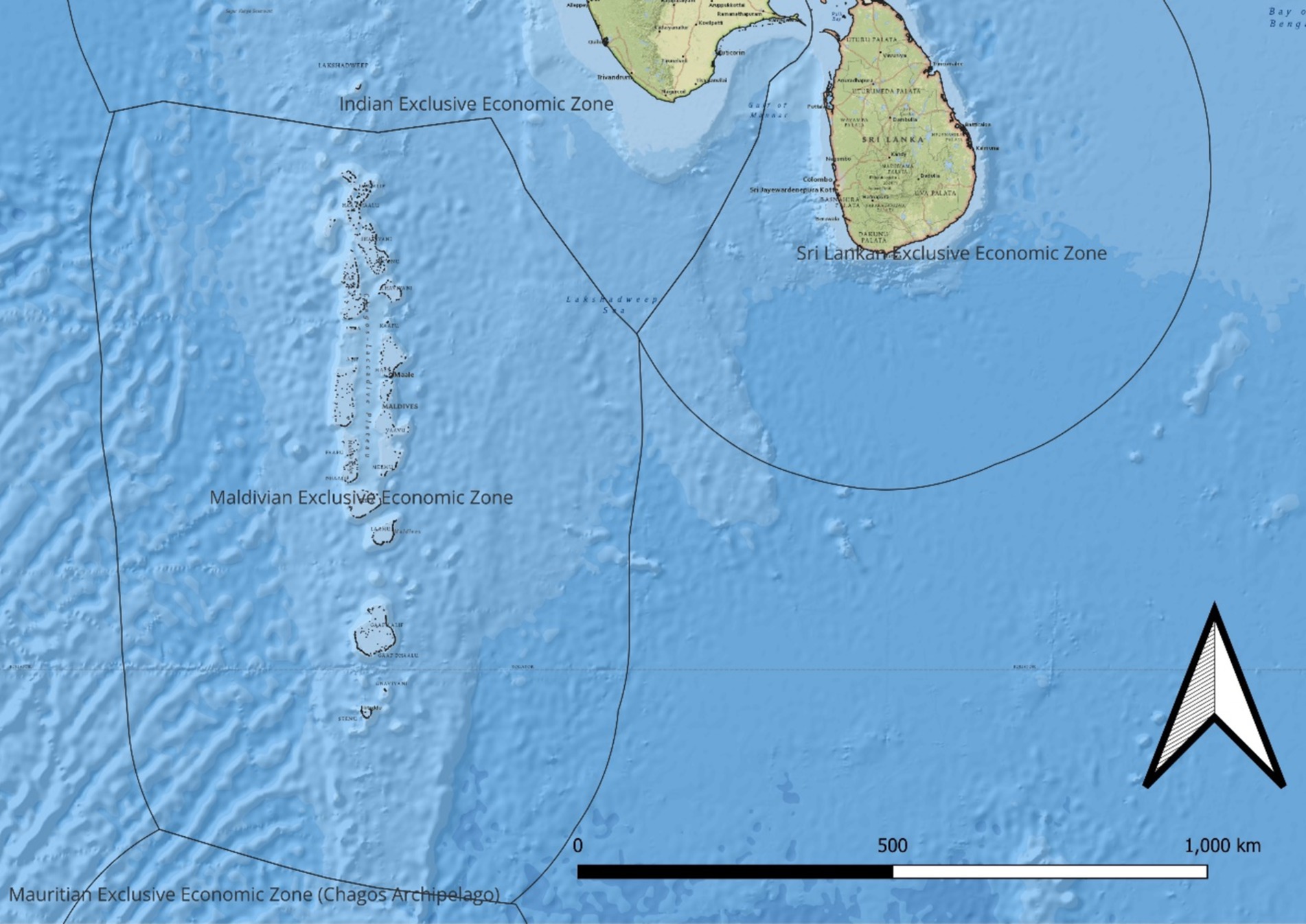
Figure 8. Western portion of the Indian Ocean in the South Asia. 186 inhabited ‘outer’ islands of the Republic of Maldives, the capital Male’ area, and other ‘large’ cities like Addu are practically invisible. Base map: National Geographic/ESRI show bathymetry in blue shades and land in green shades. EEZ data from marineregions.org.
While comparisons can be drawn between relatively isolated rural communities and small islands, significant differences also exist. For example, rural communities are likely to become connected over time (in terms of infrastructure) as populations spread, but this is unlikely in island communities. Further separation by ocean imposes formidable barriers to the delivery of goods and services, escalating costs. For example, in many of the Maldives’ outer islands, transportation costs often exceed the cost of purchasing goods in the capital. While rural communities also bear the burden of high transport costs, remote islands represent an extreme case. Borgatti (2008) analysed the impact of transportation costs using gravity models and concluded that Pacific islands’ bilateral trade has mainly been affected by distance.
Scale-warped images of the world
The study of islands has long provided remarkable, globally applicable insights. Charles Darwin’s research on the Galápagos Islands initially appeared to be simple fieldwork, but it eventually contributed to the theory of evolution, which became the unifying principle of biology (Darwin, 1859). Island studies scholar Godfrey Baldacchino (2007) asserts that the field of ethnography was significantly advanced by island studies, citing examples such as Bronislaw Malinowski’s work in Papua New Guinea (1922) and Margaret Mead’s research in Samoa and the Admiralty Islands (1928, 1934). Baldacchino notes that islands serve as advance indicators of future trends or extreme versions of phenomena observed elsewhere in less pronounced forms.
This perspective is especially relevant to the present context. While overused, the trope “islands as canaries in the climate coal mine” (Benwell, 2011) remains true. As climate change intensifies, islands provide frontline evidence of its global impacts, illustrating the urgent need for proactive climate action (Baldacchino, 2023). Figure 9 shows the land area and population fractions below 5 m above mean sea level. Four atoll islands from the SIDS group—Maldives, Tuvalu, Marshall Islands, and Kiribati—have nearly all their land and populations below this elevation. Connecting vulnerability solely to elevation might seem crude, but it remains an important factor. For example, the Netherlands, a third of whose landmass is below sea level, is less vulnerable due to robust defences against ocean and flood risks. However, for small islands, a significant proportion of the population lives near sea level, often without adequate defences, heightening their vulnerability. This vulnerability is further intensified by the fragmentation of land and population across numerous inhabited islands: 187, 21, 24, and 20 for the Maldives, Tuvalu, Marshall Islands, and Kiribati, respectively. According to IPCC AR-6 estimates (Mycoo et al., 2022), 50% of the population in the Pacific and over 50% of the infrastructure are within 10 km of the coast. The most immediate threat stems from rising sea levels, exacerbated by changes in wave climate and the increased frequency of tropical cyclones, which will likely cause more frequent coastal flooding and erosion of low-lying coasts and reef islands. Further, Mycoo et al. (2022) identify freshwater systems on small islands as among the most vulnerable due to the dynamic impacts of climate change and increasing aridity, leading to freshwater stress and significantly affecting associated ecosystems, including coral reefs.
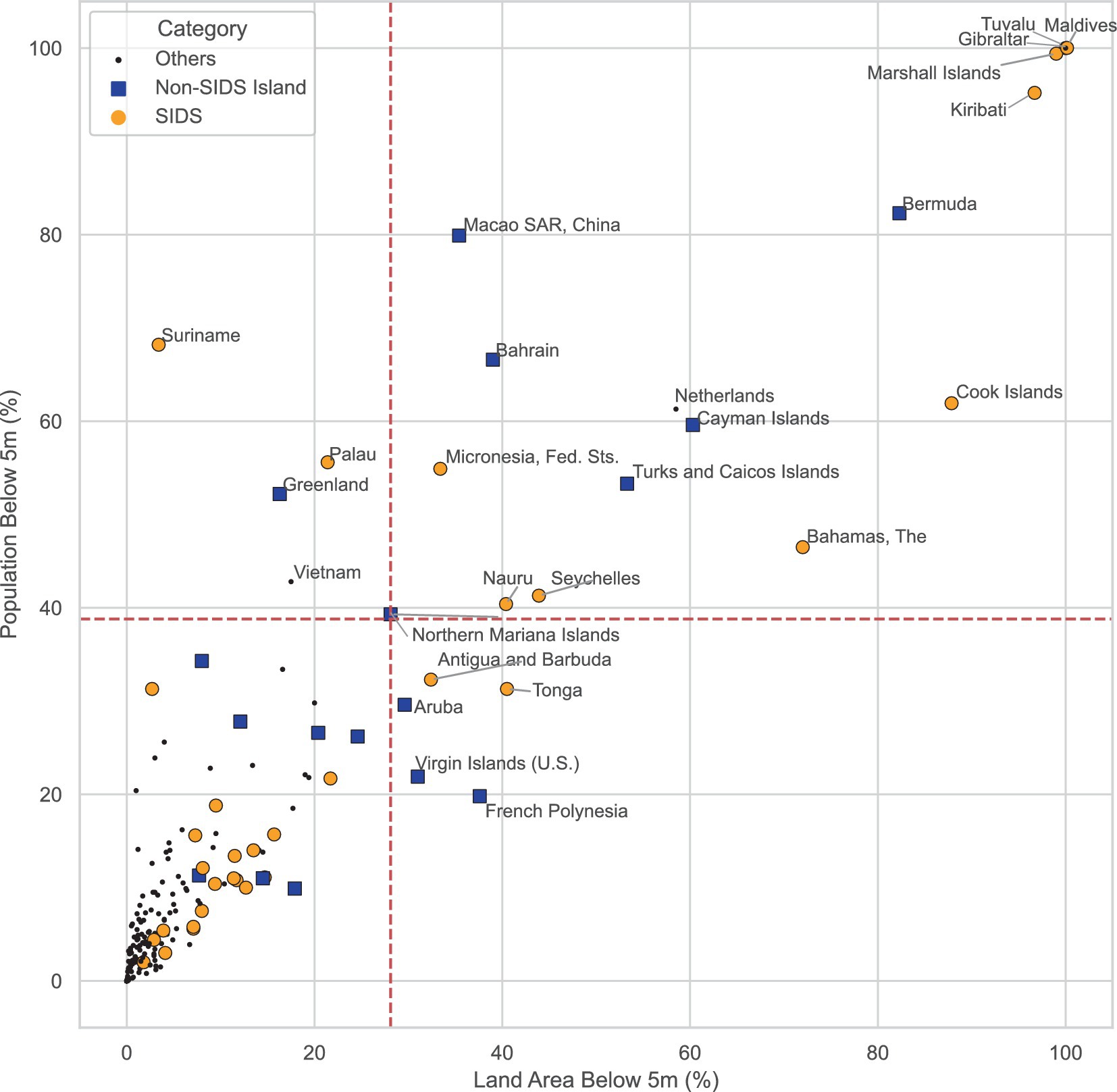
Figure 9. The percentage of population living below 5 m above mean sea level vs. fraction of land below 5 m above MSL. 90th percentiles are marked and countries exceeding 90th percentile at least in one variable are labelled (total 27). Out of these, 13 are SIDS and 24 are small islands (Except Netherlands, Vietnam and Gibraltar). Maldives, Tuvalu, Marshall Islands and Kiribati have nearly 100% of the land below 5 m and all the population live below 5 m. Data extracted (by scraping) from The Little Data Book on Climate Change (World Bank, 2011).
Regarding adaptation, while some strategies are in place and certain communities show resilience through robust social safety nets and cultural assets, there remains a significant gap in understanding the effectiveness and scale necessary for successful adaptation. Limited access to climate finance, inadequate climate data, and lack of local knowledge integration are compounded by systemic barriers such as inadequate governance and financial and human resources. Dire as this situation is, these should be seen not only as obvious calls for action to improve adaptation in small islands but also as early warning signs of the general, undesirable direction the earth system is moving along. Watts (2019), in her book “Energy at the End of the World: An Orkney Islands Saga,” states, “Islands are often on the planetary frontline of environmental change. Their long shorelines and specialised ecosystems are finely tuned and sensitive places, barometers for the Earth. They are advance indicators or extreme reproductions of what is future elsewhere.”
A critical set of factors of the “islandness” (Foley et al., 2023) results from being small, remote and surrounded by sea and the consequent issues like large coast/land ratios, small (but sometimes dense) populations that are living almost at the sea-level, limited groundwater aquifers (e.g., freshwater lenses in coral islands) bring them to the edge of vulnerability. However, these factors also make them clear case studies and ‘models’ of the rest of the world. Therefore, island studies (Baldacchino, 2018), particularly in a rapidly changing world, are not only a response of the world to address the frontline vulnerabilities of communities that have least contributed to climate change but also a remarkable scientific opportunity to see a changing world in a microcosm. Despite their importance, small islands, particularly SIDS, remain among the least studied regions. Indeed, all SIDS are not equally scientifically underexplored. There are significant differences among individual islands as well as the three SIDS regions: Carribean, Pacific and AIS (Atlantic, Indian Ocean, and South China Seas). For example, in the Caribbean, organisations such as CARICOM (Caribbean Community) and the Organization of Eastern Caribbean States (OECS) have formal governance functions alongside planning bodies like the Caribbean Planning Association (CPA) and the Caribbean Urban Forum (CUF). These groups play crucial roles in addressing the unique challenges faced by the SIDS in the region. CPA and CUF regularly host conferences to discuss key planning initiatives. Additionally, the master’s program in planning at the University of the West Indies, based in Trinidad and Tobago, further enhances research and the development of planning solutions for these pressing issues in the Caribbean region.
Similarly, the Pacific SIDS region has the Pacific Islands Forum Secretariat (PIFS), the region’s premier political and economic policy organisation, aiming to stimulate economic growth and enhance political governance and security for the region. The secretariat of the Pacific Regional Environment Programme (SPREP) focuses on protecting and managing the environment and natural resources of the Pacific SIDS. Pacific Community (SPC) is the region’s principal scientific and technical organisation, facilitating sustainable development via people-centred approaches to science, research and technology.
Compared to other regions, the AIS region has far fewer such organisations. SIDS Youth AIMS Hub (SYAH) is a youth-led non-governmental organisation focused on advancing and implementing youth-led sustainable development in SIDS in the AIMS (including the Mediterranean) region. Several other organisations focus on many regional countries, such as the ‘Indian Ocean Commission (IOC)’, which focuses on Comoros, Reunion, Madagascar, Mauritius and Seychelles (United Nations, 2024) and “Vanilla Islands” centres on Comoros, Mauritius, Madagascar, La Reunion, Seychelles Maldives and Mayotte. According to the available information, there are no accepted pan-regional organisations with national mandates in the AIS/AIMS region.
Living laboratories
Hillbom et al. (2023) state that SIDS are highly overrepresented among the most data-poor countries globally. Based on SDG data (since 2010), all SIDS were categorised as Poor, Medium, and Good countries. Accordingly, all SIDS, except for the Medium categorised Dominican Republic, Mauritius, Jamaica, and Haiti, fall into the Poor category. Notably, these four outliers are either single large islands or are dominated by a single large island [such as Mauritius, where 91% of the area and 96% of the population are concentrated on the main island (Statsmauritius, 2023)]. This observation, though anecdotal, highlights a more complex reality regarding the ability of small island states to gather high-quality data. The fragmentation of population and land across numerous islands complicates data collection, much like the challenges in travel and transport.
Conducting ethnographic studies and survey-based research in large population centres, such as cities, often faces the challenge of sampling bias. While it is theoretically possible to select an ideal minimal sample size (e.g., with a 5% error margin and a confidence interval of 95%, a large population can be represented by a sample of about 385), achieving truly random sampling in practical field research is challenging. One key advantage of conducting social research on small islands is the ability to sample almost the entire population. For instance, the 113 inhabited islands of the Maldives (Figure 7) have populations of less than 1,000, each representing fewer than 150 households. These small population sizes make it feasible to (relatively easily) organise longitudinal studies spanning multiple years.
A defining feature of small coral islands is their freshwater systems, often confined to a freshwater lens with well-defined boundaries and rapid response times. These characteristics make them ideal for monitoring and testing groundwater quality and remediation techniques, such as managed aquifer recharge. Unlike large-scale aquifers, atoll freshwater lenses react quickly, allowing for a clear observation of both degradation due to land-use change and remediation efforts.
Many small inhabited islands have been equipped with infrastructure services. For example, most of the Maldivian outer islands have electricity, piped water supply, and, in some cases, sewerage and drainage systems. The essential ‘islandness’ of these services (each island requiring its own power generation, water treatment, etc.) provides a valuable set of case studies for research on infrastructure, whether it be sustainability, performance, or economics. These islands also offer opportunities to pilot innovative solutions that may be more cost-effective and sustainable.
Small islands, particularly those in the Global South, are often prone to the disconnect between ambitious policies and the disappointing reality of water service delivery (Adams et al., 2020), and SIDS, are not exempt from this. Often, a lack of life-cycle planning and proper business cases leads to large investments failing to deliver long-term solutions (Foon, 2023). While this issue is not specific to small islands, they provide an excellent observatories for studying the impacts of such unsustainability due to their relatively simpler system boundaries, smaller populations, and more compact governance structures.
Due to their small populations and compact social structures, small islands often exhibit high levels of social cohesion and networking, leading to effective social navigation (Farzan and Brusilovsky, 2018; Jarvis, 2018). The author’s fieldwork experience in the Maldivian islands supports this observation. These social structures become invaluable when conducting both natural and social science research. Particularly with good collaboration with local volunteer organisations and clubs, it is possible to comprehensively engage with the entire island, whether studying physical systems or social entities. However, it is important not to generalise this to all SIDS or small islands. Soobratty (2016), focusing on Mauritius and the Solomon Islands, highlights the unique social and economic challenges related to social cohesion. In Mauritius, achieving true social cohesion remains challenging due to its diverse society. Similarly, the Solomon Islands experience social fragmentation caused by ethnic conflicts. Studying the recovery of four communities in Puerto Rico, Sobhaninia (2023) concluded that social cohesion positively impacts adaptation and recovery immediately after a disaster, though the effect diminishes over time. Jarvis (2018) found that the youth th in French Polynesia engage in a dynamic process of social cohesion as they balance local traditions with global influences when making decisions about their future. The impact of social cohesion on resilience and social navigation in small communities like those of some SIDS warrants further exploration.
The romanticised notions of ‘island life’—such as ‘pristine environments’ and idyllic ‘island people’—have likely never been true (Baldacchino, 2008). For instance, Maldivian outer islands are well connected with the capital, Male, and other population centres through daily speed boat services, although these can be somewhat unaffordable for the average inhabitant. Many residents are employed in population centres or nearby tourist resorts and return home once every few weeks. At the same time, nearly all islands have a significant expatriate population [approximately 26% of the entire country’s population are expatriates, with 13.5% in the outer islands (Census Maldives, 2023)], typically economic migrants from other South Asian countries (Chowdhury and Wadood, 2023). Similar to other small islands, there is also considerable rural-to-urban (or ‘island to capital’) migration within the Maldives (Hickey and Unwin, 2020). Thus, assuming these islands are completely isolated would be unrealistic and unhelpful for research purposes. However, they still offer a relatively high degree of transparency, simplicity, and accessibility for research endeavours.
A discussion of the living laboratories approach would be incomplete without addressing the potential for exploitation and misuse of island communities. While SIDS offer unique opportunities for studying climate change and sustainability, they can be vulnerable to being co-opted by external interests for scientific or policy experiments that prioritise external agendas over local well-being. Research approaches may fail to reflect the specific cultural, social, and environmental contexts, thereby undermining local autonomy and deepening existing inequalities. Frameworks that prioritise the sovereignty and resilience of these communities should be promoted, ensuring that they retain control over their development trajectories. Integrating local knowledge systems and safeguarding against the imposition of external solutions is essential. Ethical engagement with islands must prioritise their sovereignty, resilience, and capacity to lead their own adaptation efforts rather than treating them as passive subjects forced to adopt externally imposed solutions. Often overlooked is the capacity of these islands to offer innovative and localised solutions to global sustainability challenges. Due to their small size and the immediacy of climate impacts, SIDS have developed a range of adaptive measures that other nations could learn from. For example, many SIDS have implemented community-based adaptation practices (Clarke et al., 2019), integrated renewable energy systems like solar and wind (Leal Filho et al., 2022), and pioneered eco-tourism as a sustainable economic model (Walker et al., 2021). Their ability to experiment with such solutions on a smaller scale offers valuable insights into how similar strategies could be scaled up or adapted in more diverse global contexts. By fostering resilience through adaptive governance, local knowledge, and sustainable resource management (Petzold, 2020), small islands can not only manage their own vulnerabilities but also serve as testing grounds for innovative solutions that can inform broader global efforts to combat climate change and promote sustainable development.
Conclusion
Using contemporary data, this paper highlights the unique challenges confronted by small islands and SIDS in the context of sustainability and climate change. Despite strategic adaptation efforts, small islands remain particularly vulnerable due to their geographical isolation, limited resources, and heightened exposure to climate impacts. While they have lower poverty rates than other regions in the Global South, their position on the frontline of climate vulnerability and the challenges posed by economies of scale make them some of the world’s most at-risk communities. Further, small islands, especially SIDS, are among the most data-poor regions globally, thus complicating efforts to monitor and respond to environmental changes effectively. The geographical fragmentation of these islands exacerbates infrastructure and data collection challenges, affecting their development and adaptation strategies.
This paper emphasises the dual role of small islands as they are among the most at-risk regions, but they also serve as microcosms that provide valuable lessons for the rest of the world. Due to the relatively well-defined boundaries, smaller systems, and cohesive populations, small islands are ideal for studying the intricate interactions between natural and anthropogenic systems. These characteristics enable small islands to act as early indicators of broader climate impacts, offering a condensed and accelerated view of environmental, social, and economic phenomena and their complex interactions.
Ultimately, small islands exemplify the urgent need for global climate actions. By investing in and learning from these “living laboratories,” the world can gain crucial insights into the broader challenges posed by climate change and develop more effective strategies to mitigate its impacts worldwide. The experiences of small islands can guide towards a more sustainable and resilient future for all, as they provide early indicators of what climate change will bring to the rest of the world.
Author contributions
AP: Conceptualization, Data curation, Formal analysis, Investigation, Methodology, Resources, Software, Validation, Visualization, Writing – original draft, Writing – review & editing.
Funding
The author(s) declare that financial support was received for the research, authorship, and/or publication of this article. This research was partly funded by grant number 108944 (DGIS SIDS 3) under the Water and Development Partnership Programme Phase 2, and number 111129 (DUPC3 3SWater) under the Water and Development Partnership Programme Phase 3.
Acknowledgments
Thanks to ICDC, CEN, and the University of Hamburg for IIDAB data support, USGS for Global Islands data, and the World Bank for global data. My sincere gratitude to Dr. Janaka Bamunawala of Tohoku University, Japan, for his invaluable assistance in proofreading the accepted manuscript and for providing insightful suggestions that greatly enhanced its clarity.
Conflict of interest
The author declares that the research was conducted in the absence of any commercial or financial relationships that could be construed as a potential conflict of interest.
Generative AI statement
The author used ChatGPT 4o to assist with python scripting that was used to create the graphs used in this manuscript. The python language scripts used to generate the graphs are made available at https://github.com/asselapathirana/small_islands_living_labs.
Publisher’s note
All claims expressed in this article are solely those of the authors and do not necessarily represent those of their affiliated organizations, or those of the publisher, the editors and the reviewers. Any product that may be evaluated in this article, or claim that may be made by its manufacturer, is not guaranteed or endorsed by the publisher.
References
Acciarri, M. F., Checola, S., Galli, P., Magatti, G., and Stefani, S. (2021). Water resource management and sustainability: a case study in Faafu atoll in the Republic of Maldives. Sustain. For. 13:3484. doi: 10.3390/su13063484
Adams, E. A., Zulu, L., and Ouellette-Kray, Q. (2020). Community water governance for urban water security in the global south: status, lessons, and prospects. Wiley Interdiscip. Rev. Water 7:e1466. doi: 10.1002/wat2.1466
Adshead, D., Roman, O., Thacker, S., and Hall, J. W. (2021). Infrastructure strategies for achieving the global development agendas in small islands. Earth's Future 9:e2020EF001699. doi: 10.1029/2020EF001699
Albert, J., Bogard, J., Siota, F., McCarter, J., Diatalau, S., Maelaua, J., et al. (2020). Malnutrition in rural Solomon Islands: an analysis of the problem and its drivers. Matern. Child Nutr. 16:e12921. doi: 10.1111/mcn.12921
Arévalo, P., Cano, A., and Jurado, F. (2022). Mitigation of carbon footprint with 100% renewable energy system by 2050: the case of Galapagos islands. Energy 245:123247. doi: 10.1016/j.energy.2022.123247
Baldacchino, G. (2006). Managing the hinterland beyond: two ideal-type strategies of economic development for small island territories. Asia Pac. Viewp. 47, 45–60. doi: 10.1111/j.1467-8373.2006.00295.x
Baldacchino, G. (Ed.) (2007). “Introducing a world of islands”. in A world of islands: an island studies reader (Canada: Island Studies Press), 1–29.
Baldacchino, G. (2008). Studying islands: on whose terms? Some epistemological and methodological challenges to the pursuit of island studies. Island Stud. J. 3, 37–56. doi: 10.24043/001c.81189
Baldacchino, G. (2023). Why should we study islands and archipelagos? Rethink. Island Methodol. :21. doi: 10.5771/9781538165201-21
Baldacchino, G. (Ed.). The Routledge international handbook of island studies: a world of islands. Oxon, UK: Routledge.
Balzan, M. V., Potschin-Young, M., and Haines-Young, R. (2018). Island ecosystem services: insights from a literature review on case-study island ecosystem services and future prospects. Int. J. Biodiv. Sci. Ecosyst. Serv. Manag. 14, 71–90. doi: 10.1080/21513732.2018.1439103
Benwell, R. (2011). The canaries in the coalmine: small states as climate change champions. Round Table 100, 199–211. doi: 10.1080/00358533.2011.565632
Borgatti, L. (2008). Pacific islands' bilateral trade: the role of remoteness and of transport costs. J. Int. Dev. J. Dev. Stud. Assoc. 20, 486–501. doi: 10.1002/jid.1473
Bush, M. J. (2018). Climate change adaptation in small island developing states. Oxford, UK: John Wiley & Sons.
Calado, H., Quintela, A., and Porteiro, J. (2024). Integrated coastal zone management strategies on small islands. J. Coast. Res. 50, 125–129. doi: 10.2112/JCR-SI50-025.1
Census Maldives. (2023). Island-atoll-level-indicator-sheets, 2022 sensus. Available at: https://census.gov.mv/2022/island-atoll-level-indicator-sheets/ (Accessed May 2024).
Chowdhury, M., and Wadood, S. N. (2023). “Internal and forced migration and economic development in South Asia” in Migration in South Asia: IMISCOE regional reader (Cham: Springer International Publishing), 17–35.
CityPopulation. (2023). Available at: https://www.citypopulation.de/ (Accessed May 2024).
Clarke, T., McNamara, K. E., Clissold, R., and Nunn, P. D. (2019). Community-based adaptation to climate change: lessons from Tanna Island, Vanuatu. Island Stud. J. 14, 59–80. doi: 10.24043/isj.80
Connell, J. (2023). “COVID-19 and tourism in Pacific SIDS: lessons from Fiji, Vanuatu and Samoa?” in COVID-19 in the Commonwealth. (Oxon, UK: Routledge), 140–149.
Darwin, C. (1859). On the origin of species by means of natural selection, or preservation of favoured races in the struggle for life. London: John Murray.
Dean, A., Green, D., and Nunn, P. D. (2016). “Too much sail for a small craft? Donor requirements, scale, and capacity discourses in Kiribati” in Island geographies (Routledge), 68–91.
Dégremont, M. (2022). LSMPA sovereignties in New Caledonia and French Polynesia: territorialities, alliances and powers in Oceania. Oceania 92, 51–73. doi: 10.1002/ocea.5331
di Friedberg, M. S., Malatesta, S., and dell'Agnese, E. (2020). Hazard, resilience and development: the case of two Maldivian Islands. Bollettino della Società Geografica Italiana, 11–24. doi: 10.36253/bsgi-1087
Druten, SV. (2023). The Galapagos paradox: negotiating conservation and human development (Master's thesis).
Dubrie, A, Bello, O, Phillips, W, Thorne, E, and Alleyne, D. (2020). Proposal for a revitalized Caribbean development and cooperation committee-regional coordinating mechanism for sustainable development (CDCC-RCM): repositioning CDCC-RCM as the mechanism for sustainable development in Caribbean small island developing states (SIDS).
Fernandes, R., and Pinho, P. (2017). The distinctive nature of spatial development on small islands. Prog. Plan. 112, 1–8. doi: 10.1016/j.progress.2015.08.001
Foley, A., Brinklow, L., Corbett, J., Kelman, I., Klöck, C., Moncada, S., et al. (2023). Understanding “Islandness”. Ann. Am. Assoc. Geogr. 113, 1800–1817. doi: 10.1080/24694452.2023.2193249
Foon, R. M. (2023). Asset management framework for water infrastructure in Kiribati-linking asset management with health and wellbeing through the benefits of a sustainable water supply (Doctoral dissertation): ResearchSpace@ Auckland.
Farzan, R., and Brusilovsky, P. (2018). Social navigation. Social Information Access: Systems and Technologies 2018, 142–80.
Fudjaja, L., Viantika, N. M., Rani, C., Nurdin, N., Priosambodo, D., and Tenriawaru, A. N. (2020). Anthropogenic activity and the destruction of coral reefs in the waters of small islands. IOP Conf. Ser. Earth Environ. Sci. 575:012057. doi: 10.1088/1755-1315/575/1/012057
Hau’Ofa, E. (1995). Our sea of islands. We are the ocean: selected works. Honolulu, USA: University of Hawai’i press, Honolulu, USA.
Hickey, G. M., and Unwin, N. (2020). Addressing the triple burden of malnutrition in the time of COVID-19 and climate change in Small Island developing states: what role for improved local food production? Food Secur. 12, 831–835. doi: 10.1007/s12571-020-01066-3
Hillbom, E., Palacio, A., and Tegunimataka, A. (2023). How do small island developing states meet the sustainable development goals? J. Sustain. Dev. 16, 17–37. doi: 10.5539/jsd.v16n1p17
IIDAB. (2023). Integrated Island Database (IIDAB). Available at: https://www.island-database.uni-hamburg.de (Accessed: 28 November 2024).
Jarvis, L. (2018). Dignity in decision-making: modernity and social navigation among rural French Polynesian youth. Anthropology Theses and Dissertations. doi: 10.25172/td/13446839
Kumar, R. R., and Stauvermann, P. J. (2023). Tourism and economic growth in the Pacific region: evidence from five small island economies. J. Asia Pac. Econ. 28, 894–921. doi: 10.1080/13547860.2021.1944796
Leal Filho, W., Balogun, A. L., Surroop, D., Salvia, A. L., Narula, K., Li, C., et al. (2022). Realising the potential of renewable energy as a tool for energy security in small island developing states. Sustain. For. 14:4965. doi: 10.3390/su14094965
Mata-Lima, H., Silva, D. W., Nardi, D. C., Klering, S. A., de Oliveira, T. C., and Morgado-Dias, F. (2021). Waste-to-energy: an opportunity to increase renewable energy share and reduce ecological footprint in small island developing states (SIDS). Energies 14. doi: 10.3390/en14227586
Messerli, P, Murniningtyas, E, Eloundou-Enyegue, P, Foli, EG, Furman, E, Glassman, A, et al. (2019). Global sustainable development report 2019: the future is now–science for achieving sustainable development.
Mycoo, M., Wairiu, M., Campbell, D., Duvat, V., Golbuu, Y., Maharaj, S., et al. (2022). “Small islands” in IPCC WGII sixth assessment report.
Neves, D., Silva, C. A., and Connors, S. (2014). Design and implementation of hybrid renewable energy systems on micro-communities: a review on case studies. Renew. Sust. Energ. Rev. 31, 935–946. doi: 10.1016/j.rser.2013.12.047
Nicholls, R., Brown, S., Hanson, S., and Hinkel, J. (2010). Economics of coastal zone: adaptation to climate change. Development and climate change discussion paper; no. 10. Washington, D.C.: World Bank Group.
Nunn, P. D. (1987). Small islands and geomorphology: review and prospect in the context of historical geomorphology. Trans. Inst. Br. Geogr. 12:227. doi: 10.2307/622530
Pauly, D., Zeller, D., and Palomares, M.L.D., (2020). Sea around us concepts, design and data [WWW document]. Available at: https://www.seaaroundus.org/ (Accessed May 2024).
Peterson, R. R. (2023). Over the Caribbean top: community well-being and over-tourism in small island tourism economies. Int. J. Community Well-Being 6, 89–126. doi: 10.1007/s42413-020-00094-3
Petzold, J. (2020). “Enabling adaptive governance through social capital in small island developing states” in Handbook of governance in small states. (Abingdon, Oxon: Routledge), 275–284.
Pratt, S. (2015). The economic impact of tourism in SIDS. Ann. Tour. Res. 52, 148–160. doi: 10.1016/j.annals.2015.03.005
Puig-Cabrera, M., Martínez-del Vas, G., Beltrán-Bueno, M. Á., and Nuevo-López, A. (2023). Tourism towards the well-being of small island developing states: tourism agenda 2030. Tour. Rev. 78, 614–629. doi: 10.1108/TR-02-2022-0100
Rasheed, A. A. (2019). Role of small islands in UN climate negotiations: a constructivist viewpoint. Int. Stud. 56, 215–235. doi: 10.1177/0020881719861503
Rolland, L. J. (2024). Charting climate discourses: the power of ideas and the role of SIDS in crafting the 1.5° C norm in international climate negotiations. logane jo rolland department of political science, university of British Columbia POLI 492: Honours Thesis. Available at: https://open.library.ubc.ca/media/download/pdf/52966/1.0443811/5
Sachs, J., Massa, I., Marinescu, S., and Lafortune, G. (2021). The decade of action and small island developing states: measuring and addressing SIDS’ vulnerabilities to accelerate SDG progress. Sustain. Dev. Solut. Netw. 50.
Sayre, R., Noble, S., Hamann, S., Smith, R., Wright, D., Breyer, S., et al. (2018). A new 30 meter resolution global shoreline vector and associated global islands database for the development of standardized global ecological coastal units. Journal of Operational Oceanography – A Special Blue Planet Edition. doi: 10.1080/1755876X.2018.1529714
Scheyvens, R. (2011). The challenge of sustainable tourism development in the Maldives: understanding the social and political dimensions of sustainability. Asia Pac. Viewp. 52, 148–164. doi: 10.1111/j.1467-8373.2011.01447.x
Scheyvens, R., and Momsen, J. H. (2020). “Tourism and poverty reduction: issues for small island states” in Tourism and sustainable development goals. (Abingdon, Oxon: Routledge), 111–129.
Shivakoti, B. R., Shiiba, N., and King, P. (2022). “Capacity-building around indigenous and local knowledge (ILK) systems for effective climate adaptation in the low-lying coasts and Small Islands” in Assessing, mapping and modelling of mangrove ecosystem services in the Asia-Pacific Region (Singapore: Springer Nature Singapore), 251–261.
Sobhaninia, S. (2023). Does social cohesion accelerate the recovery rate in communities impacted by environmental disasters in Puerto Rico? An analysis of a community survey. Environ. Adv. 13:100400. doi: 10.1016/j.envadv.2023.100400
Soobratty, J. B. (2016). Exploring the potentials of intercultural education in sustaining social cohesion in small island developing states. Int. J. Learn. Teach. Educ. Res. 13.
Statsmauritius. (2023). Population and Vital Statistics - Republic of Mauritius January – June 2022. Available at: https://statsmauritius.govmu.org/Pages/Statistics/ESI/Population/Pop_Vital_Jan-Jun22.aspx (Accessed May 8, 2024).
Tandrayen-Ragoobur, V., Banerjee, S., Fauzel, S., and Matadeen, J. (2024). “Climate change, equity and sustainable development in small island developing states” in Equity and sustainability (Singapore: Springer Nature Singapore), 67–90.
Thomas, A., Baptiste, A., Martyr-Koller, R., Pringle, P., and Rhiney, K. (2020). Climate change and small island developing states. Annu. Rev. Environ. Resour. 45, 1–27. doi: 10.1146/annurev-environ-012320-083355
UN, Department of Economic and Social Affairs Sustainable Development. (2023). Small island developing states: sustainable development knowledge platform. United Nations. Available at: https://sustainabledevelopment.un.org/topics/sids (Accessed May 4, 2024)
United Nations. (2024). Aims regional support | office of the high representative for the least developed countries, landlocked developing countries and Small Island Developing States. United Nations. Available at: https://www.un.org/ohrlls/aims-regional-support (Accessed October, 2024).
Walker, B. T., Lee, T. J., and Li, X. (2021). Sustainable development for small island tourism: developing slow tourism in the Caribbean. J. Travel Tour. Mark. 38, 1–5. doi: 10.1080/10548408.2020.1842289
Watts, L. (2019). Energy at the end of the world: An Orkney Islands saga. MA, USA: MIT Press Cambridge. (Accessed January 15, 2019).
Wilson, R. (2017). Impacts of climate change on mangrove ecosystems in the coastal and marine environments of Caribbean Small Island developing states (SIDS). Caribbean Climate Change Report Card Sci. Rev. 2017, 61–82.
Keywords: small island developing states, sustainability, marginalised and vulnerable groups, Maldives archipelago, climate vulnerability, Pacific islands, Caribbean islands, Indian Ocean and South China Sea (AIS) islands
Citation: Pathirana A (2025) Small islands: living laboratories revealing global climate and sustainable development challenges. Front. Clim. 6:1445378. doi: 10.3389/fclim.2024.1445378
Edited by:
Ayyoob Sharifi, Hiroshima University, JapanReviewed by:
Carmelina Cosmi, National Research Council (CNR), ItalyDavid Brown, McGill University, Canada
Copyright © 2025 Pathirana. This is an open-access article distributed under the terms of the Creative Commons Attribution License (CC BY). The use, distribution or reproduction in other forums is permitted, provided the original author(s) and the copyright owner(s) are credited and that the original publication in this journal is cited, in accordance with accepted academic practice. No use, distribution or reproduction is permitted which does not comply with these terms.
*Correspondence: Assela Pathirana, YS5wYXRoaXJhbmFAdW4taWhlLm9yZw==
 Assela Pathirana
Assela Pathirana